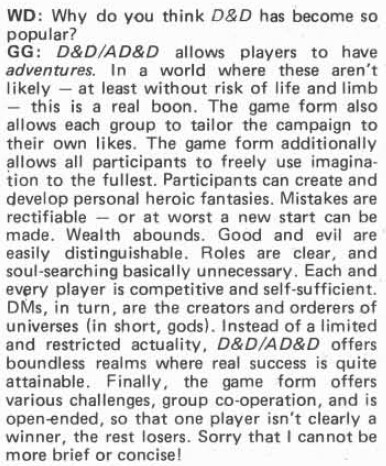White Dwarf Interviews Gary Gygax
 Issue #14 of White Dwarf features a long interview with Gary Gygax by Ian Livingstone. As I mentioned in my earlier post, it's a surprisingly good interview in which Gygax says a few things I don't believe I've ever read anywhere else. For instance, when asked about "the original inspiration for D&D," Gygax responds in this way:
Issue #14 of White Dwarf features a long interview with Gary Gygax by Ian Livingstone. As I mentioned in my earlier post, it's a surprisingly good interview in which Gygax says a few things I don't believe I've ever read anywhere else. For instance, when asked about "the original inspiration for D&D," Gygax responds in this way:CHAINMAIL, then Dave Arneson's campaign and Dave Megarry's game DUNGEON!
It's a short answer but it says a lot. The importance of Chainmail is well known and obvious. The significance of Arneson's pre-D&D Blackmoor campaign is likewise widely acknowledged (though the fact that Gygax so readily admits this in late 1979 is, I think, notable). The role of Dave Megarry's boardgame, on the other hand, is often forgotten nowadays. That's in part an accident of publishing history: Dungeon! as a game predates D&D but it didn't appear in published form until after OD&D appeared in 1974.
Shortly afterward, Livingstone asks Gygax about how he applied "the concept of role-playing to the novel game theme of fantasy." Gygax replies that "role-playing is common in wargaming," especially at 1:1 scale, so it wasn't a huge leap. Fantasy, meanwhile, isn't really all that novel.
Most of us, after all, are raised on fairy tales, fantasy, and myth. With that background, I actually don't view fantasy gaming as a novel idea, really, and I marvel that it wasn't done before D&D!Of course, as Gygax already admitted, it was done before D&D, by Arneson and his crew in the Twin Cities. There are also other examples of proto-FRPGs prior to 1974, such as the Lankhmar games Fritz Leiber played with Harry Fischer, but none of them, including Blackmoor, saw print until after TSR published OD&D. (As an aside, Gygax implies that Guidon Games might have published it, if it had not folded beforehand and Avalon Hill was "luke warm to suggestions about fantasy.")
Livingstone then asks Gygax about the appeal of D&D and the kinds of people who enjoy playing it. What Gygax says is quite interesting, some of it echoing things he'd said elsewhere. He starts by describing the qualities of a "good D&D player" as follows:
Imaginative retentive memory, competitive, co-operative, thorough, bold (but not rash), and quick thinking … Slightly suspicious can be added and logical and deductive reasoning powers are most useful too.
This exchange follows (which I reproduce in its entirety):
 Over the years, Gygax repeatedly made reference to the way that roleplaying games enabled ordinary people to have "adventures" in a way that was largely impossible in the contemporary world. He felt that was very important, especially for children, and, the older I get, the more I see the rightness of his belief.
Over the years, Gygax repeatedly made reference to the way that roleplaying games enabled ordinary people to have "adventures" in a way that was largely impossible in the contemporary world. He felt that was very important, especially for children, and, the older I get, the more I see the rightness of his belief. The remainder of the interview talks about D&D's prominence in the world of RPGs – Gygax is dismissive of its "imitators" – the deleterious effect of most fan-made material on the game ("rubbish"), the place of Advanced Dungeons & Dragons, his Greyhawk campaign, and his inability to play as often as he would like. As I said, it's a decent interview from a period when TSR was just on the cusp of the huge success that would propel it even farther ahead of its rivals. Gygax thus speaks with a certain degree of confidence, even swagger, but the gamer in him has not yet been fully subsumed within his "TSR Gary" persona. He is still very much the guy who enjoys playing all kinds of games and wants nothing more than to share that love with others, even as he evinces a certain degree of prickliness at the notion of anyone else horning in on "his" territory as the creator and purveyor of the world's first and most successful RPG. From the vantage point of history, it's clear that many of Gygax's strengths were the very things that, in other contexts, proved to be his weaknesses – but then so it is with all men.
The remainder of the interview talks about D&D's prominence in the world of RPGs – Gygax is dismissive of its "imitators" – the deleterious effect of most fan-made material on the game ("rubbish"), the place of Advanced Dungeons & Dragons, his Greyhawk campaign, and his inability to play as often as he would like. As I said, it's a decent interview from a period when TSR was just on the cusp of the huge success that would propel it even farther ahead of its rivals. Gygax thus speaks with a certain degree of confidence, even swagger, but the gamer in him has not yet been fully subsumed within his "TSR Gary" persona. He is still very much the guy who enjoys playing all kinds of games and wants nothing more than to share that love with others, even as he evinces a certain degree of prickliness at the notion of anyone else horning in on "his" territory as the creator and purveyor of the world's first and most successful RPG. From the vantage point of history, it's clear that many of Gygax's strengths were the very things that, in other contexts, proved to be his weaknesses – but then so it is with all men.
James Maliszewski's Blog
- James Maliszewski's profile
- 3 followers



